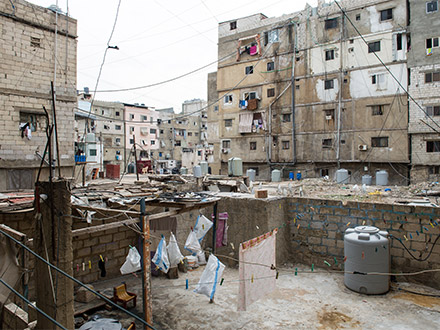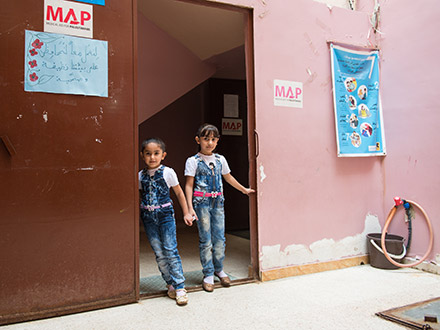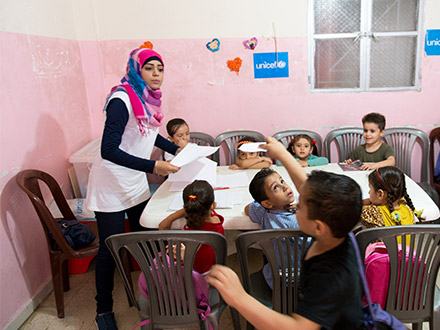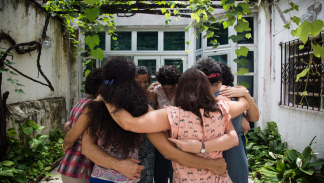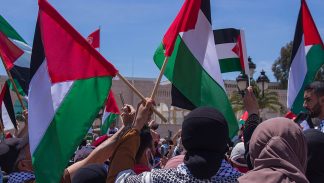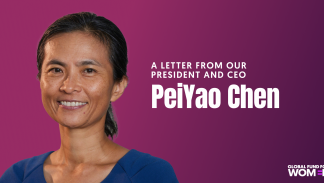Women and the Refugee Crisis: A News Update from Lebanon
The situation in the [Shatila refugee] camp is just absolutely terrible. We have a lot of problems—health problems, environmental problems, security problems…The woman is the one suffering the most, and the children.
—Nada Al Ajouz
With the past week’s deadly attacks in Paris, Beirut, and Baghdad, the situation for refugees across the Middle East and Europe has become more complex and volatile than ever. And the violent tactics used to target innocent civilians by extremist group the Islamic State, or ISIS, are at the forefront of international headlines.
In the past year, as the Syrian civil war has intensified, ISIS has increased its use of violence aimed at Syrian civilians including horrific sexual violence, trafficking, slavery, and attempted genocide. As a result, there are now more than 4.2 million Syrian refugees. They join millions of internally displaced people in Lebanon, Turkey, Jordan, Iraq, and Egypt, creating an increasingly acute refugee crisis in the region.
Global Fund for Women staff have just returned from an in-depth visit to areas in the Middle East most impacted by the massive refugee influx. They met women on the ground who are working with refugees to better understand the immediate issues facing women and girls, as well as the longer-term repercussions for women’s rights. They illuminated a growing crisis that requires urgent investment and attention. “We are at a crossroads,” says Jane Sloane, Global Fund for Women’s Vice President of Programs. “Women’s needs are acute, and the longer the situation persists, the more their fundamental human rights are threatened.”
The situation in Lebanon
Lebanon, which shares a border with Syria, has an estimated 1.1 million refugees, both Syrian refugees and about 450,000 Palestinian refugees, many of whom were born in Lebanon and have been displaced. With a total population of only 4.4 million, the massive 25% increase means a strain on already deteriorating resources and space as well as an overall impact that UN High Commissioner for Refugees, Antonio Guterres, has called “staggering.”
Many refugees live in camps like Shatila in southern Beirut. The Shatila camp is one of Lebanon’s most crowded camps, originally built to hold only 3,000 people, but now housing an estimated 15,000.
Hadija, a 35-year-old Syrian refugee from Deir ez-Zor, Syria, now lives in Shatila with her family. Here is Hadija’s story, as told to Global Fund for Women through a translator:
“We can’t find any place better than Syria. Syria is our country, our mother. Syria held us close. We lived in dignity.” Hadija has been living in Shatila a year and a half with her husband and five daughters. Through tears, she explains that she used to have six, but her daughter was killed in the war in Syria when she was five years old.
“Our village, Deir ez-Zor, is now under the hands of ISIS. Life is like a prison.” She and her family escaped as ISIS was entering the village. They moved around within Syria and slept in abandoned public schools to hide from bombings and then spent two days at the border before crossing to Lebanon.
They came to Shatila because they heard rent in Palestinian camps was cheaper. Their rent is the equivalent of $330 per month and they’re having trouble paying it. The UN Refugee Agency gives them $66 per month for food, medicine, rent. “My husband has a handicap and cannot work, he needs surgery and we cannot afford it. I’m sewing decorative hair ties and selling them to pay rent.”
Conditions in the camps are extremely challenging, with no clean water and high rates of violence against women and children. Inhabitants of the camps are in constant danger from exposed live electrical wires, a daily threat as the government refuses to supply electricity to the camps. Many refugees cannot get jobs. They are excluded from about 70 jobs including taxi drivers, according to Global Fund for Women grantee partners Tadamon and Palestinian Women’s Humanitarian Organization, leaving primarily menial labor like plumbing, cleaning, or construction available to them. Lebanese law does not extend citizenship rights to Palestinians or Syrians living in the country, limiting access to public healthcare and education in addition to jobs and increasing social harassment and stigma for refugees.
Yet—despite high levels of poverty, risk, trauma, and violence, which disproportionately fall on women—it is women who are at the forefront of long-term efforts to build community, create sustainable change, and protect and extend human rights.
Global Fund for Women’s grantee partners are leading these efforts and have been working with women refugees for years. Global Fund for Women’s advisor, Khalidat Hussein, who leads the work of grantee partner Tadamon (Arabic for “solidarity”), describes the immediate needs of women refugees, saying: “They need rest. They need education for their children. They need awareness, and preventive and reproductive health. They need to know their rights and they need some kind of economic support, like vocational training. They need legal aid.”
Addressing unique challenges for refugee women: healthcare and violence prevention
Our partners tell us that women in the refugee camps have a number of unique needs, and healthcare is foremost among them. Access to basic healthcare is an issue; for example, the UN Relief and Works Agency runs just one health center in Shatila camp, and the generic hygiene kits that are distributed by relief agencies ignore women’s basic needs like sanitary napkins.
An acute challenge is the lack of access to contraception or maternal healthcare in the camps and a lack of knowledge about reproductive health. As a result, birth rates in the camps are high, and there are high rates of infant mortality and deformity. In addition, our partners report that women who have experienced trauma or who are living in poor conditions are more likely to experience complications during delivery.
Global Fund for Women’s grantee partners are filling the gaps in access to healthcare and teaching women and girls about reproductive health and rights, including how they can access contraceptives, as well as teaching them the importance of family planning.
Olfat Mahmoud, a Palestinian refugee and the founder of Global Fund for Women grantee Palestinian Women’s Humanitarian Organization in Burj al-Barajneh camp in southern Beirut*, explains that there’s a complete lack of knowledge about maternal health and rights among many refugee women. For instance, Mahmoud shares, “Many of them think that if I’m angry, if I’m unhappy, if I’m sad, my milk will become poison, so they stop breastfeeding.”
For refugee women and children living in camps, violence has become a normalized part of life. As our partners explain, because of the trauma many people are living with, violence is an outlet. Domestic violence is widespread, and women make excuses for male violence directed toward them. “The women say things like, ‘better for me to bear his anger than the broader community’,” explains Mahmoud.
Street harassment and rape within the camps are also issues. Our partners explain that girls are told it is inappropriate for them to voice anything publicly or to scream, even when they are in danger. So they are working to change this. “Screaming is discouraged because they think it is ‘haram’ [bad],” explains Mahmoud, adding the importance of workshops that teach girls about screaming and self-defense from harassment and violence. “Recently a young girl [who had been told in a workshop to scream if she felt unsafe] screamed when an older man tried to grab her and people came running out to help her.”
In addition, forced and child marriage is common in refugee camps. According to our grantee partners, some families see marrying off their young daughters as an opportunity to keep their daughters safe, to protect family honor, and to get out of poverty given their limited economic options. They do not see it as a form of violence.
“We train women, as well as men, about early marriage because it’s a problem in their society before and now in Lebanon also,” says Laura Sfeir, a board member with Global Fund for Women grantee partner Lebanese Council to Resist Violence Against Women, which has been working to change the taboo around violence against women in Lebanon since 1997. “We train them about the results of early marriage on the physical and mental health of the girl.”
Empowering women with knowledge about their human rights
With violence against women and children taking many forms, women’s groups lead workshops and trainings to educate refugee women and girls on their human rights and to empower them to speak up to demand their rights. Our partners explain that the concept of women’s human rights is completely foreign to many refugee women, especially Syrian women. “Some women actually were having a hard time accepting this phenomenon of rights,” explains Nada Al Ajouz, a Palestinian refugee who runs a Tadamon center for women in Shatila. “Because based on their environment and what they’re living in, they don’t identify [abuses] as violence. They normalize it.”
Our grantee partners emphasize their important work to create safe spaces for refugee women to come together to discuss their challenges, meet other women in the camps, and feel empowered to share their own stories. They explain that, in these settings, many women are empowered to speak up for the first time about violence they have experienced.
“These workshops have benefited so many women, especially Syrians,” explains Rajaa Iass, a Palestinian refugee who was born in and has lived in the Shatila camp most of her life. She learned about women’s rights in a workshop led by Tadamon, and now helps run workshops to help other refugee women experiencing domestic violence.
“When we give women all the information about human rights, they become stronger, and they come to our organization after to speak about their problems, about their violence, all forms of violence,” adds Sfeir.
Demanding systemic change by changing laws and attitudes
Women’s groups are at the forefront of changing attitudes and behaviors within the camps. In addition to the workshops they are providing to women and girls, our grantee partners are also working with men and boys to help change norms around violence and women’s rights. For instance, Palestinian Women’s Humanitarian Organization is engaging men to do outreach and teach more men about women’s rights and women’s unique needs, including the importance of sexual health.
Global Fund for Women’s grantee partners are also working on a national and international scale to change laws that impact women and refugees. Just last year, in 2014, Global Fund for Women grantee partners, including the Lebanese Women Democratic Gathering (known as RDFL), led the charge to get the first-ever law against domestic violence passed in Lebanon.
“When you’re supporting a cohort of women’s groups, it makes a difference,” emphasizes Jane Sloane, about Global Fund for Women’s approach. “It’s not just what they’re doing in the camps, but it’s what they’re learning and doing together on legal advocacy and policy levels. That’s critical to making change happen.”
Women’s groups lead change, but the need is great
Women’s groups are filling critical gaps to meet the needs of refugees in the camps, and driving long-term change around women’s human rights. But, as Khalidat Hussein says, “demand far outstrips our ability to provide support.” This is a sentiment echoed by all our partners working with refugee women.
The situation in the camps continues to deteriorate, and few of our grantees have the resources to tackle women’s and children’s most immediate needs, let alone to expand maternal and new-born healthcare, increase access to contraception, support women’s income-generating projects, or oppose the increasing culture of violence against women and children. Without sustained efforts on these important facets of women’s rights, the future for refugee women and children in the camps is bleak.
While many other organizations are focused on humanitarian interventions, few are focused on women’s specific needs, or on the work that needs to be done to underpin long-term gender equality and rights.
“It is infinitely preferable for a woman to know her rights and to draw on her own power to create change than to be the passive recipient of welfare that keeps her dependent,” explains Jane Sloane. “While there are larger organizations providing psychological support and emergency relief to children in particular, proving broader empowerment programs for women is essential to shift power and support real and sustained change within the community.”
Rajaa Iass, a Palestinian refugee who was born in Shatila and is now raising three children there, is just one of countless women who personifies the value of empowering women to drive change. She explains that she was always a bold person but that the activities she’s been a part of through Tadamon have increased her boldness and improved the way she’s raising her children.
She proclaims: “I should have my own existence as a woman. I should have a role to play. I’m here to raise generations. I need to exist as a human being.”
*Note: The Burj al-Barajneh camp—where Global Fund for Women grantee partner Palestinian Women’s Humanitarian Organization is based—is located in the Burj al-Barajneh neighborhood of Beirut where the two deadly suicide bombings took place on Friday, November 13. We’ve confirmed with Olfat Mahmoud that she, her family, and her team who work with Palestinian Women’s Humanitarian Organization are safe.
All photography by Alissa Everett for Global Fund for Women.
Help meet the growing needs of women refugees
With your help, Global Fund for Women can provide critical support to women’s groups in Lebanon, Iraq, and Jordan working directly with women and children refugees to create safe spaces, meet unique needs like healthcare, and teach women their rights so they can drive lasting change.
